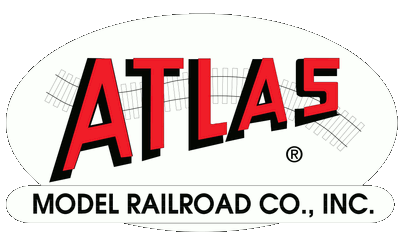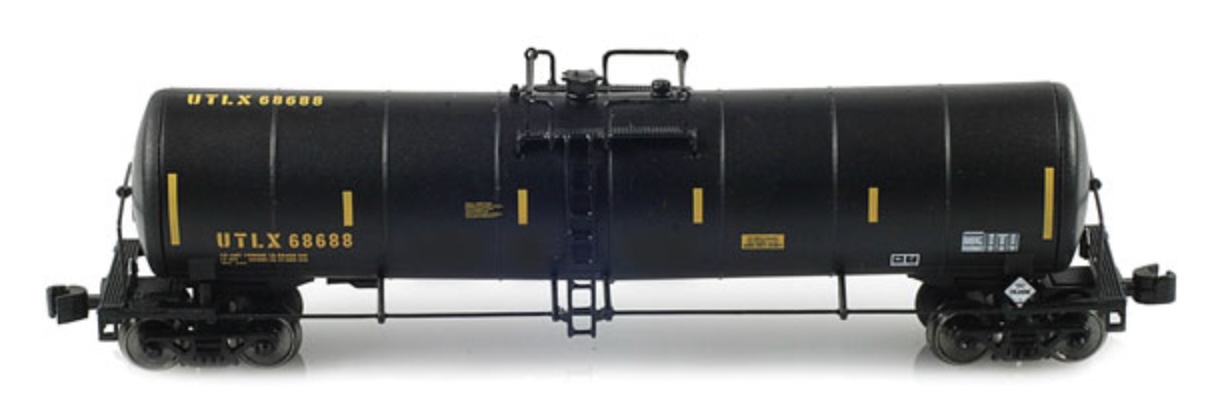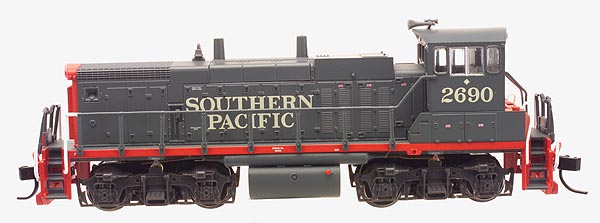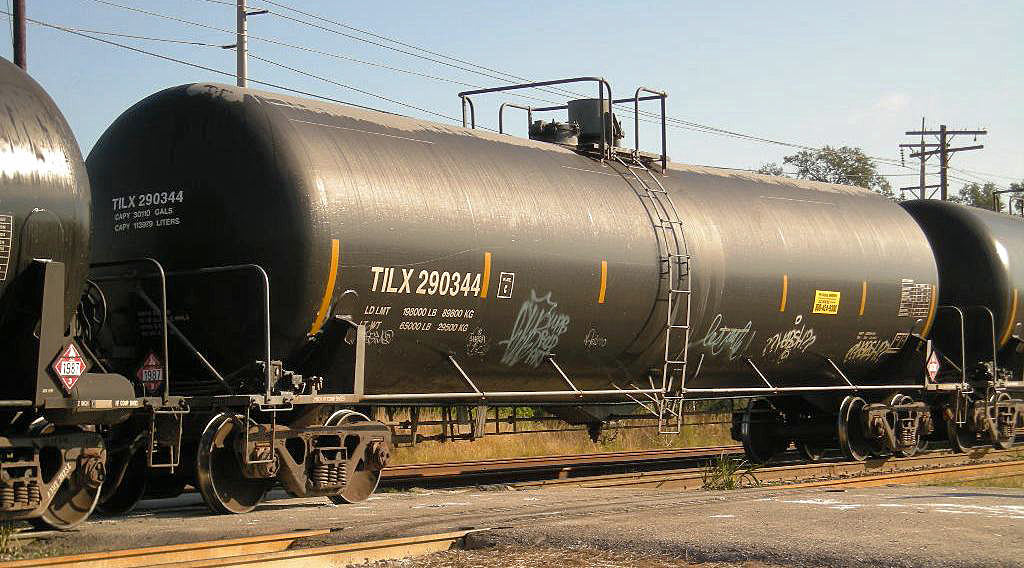Body Style Information: This is a model of an ACF® Industries built general-purpose, single-compartment, 23,500 gallon, insulated, coiled, non-pressurized tank car. Our model represents cars built from 1969 and still in service today. A wide variety of products can be transported in this size and type of tank car. This includes asphalt, ethanol, fuel oil, metal sodium, molten phenol, paraffin wax, tallow, urethane polyol, and vegetable oil.
Features: Separately molded brake line plumbing Ultra-thin handrails Tank fittings and safety placards 100-ton roller-bearing trucks Brake wheel chain detail Accurate painting and lettering Factory-installed AccuMate® magnetic knuckle couplers
Features: Separately molded brake line plumbing Ultra-thin handrails Tank fittings and safety placards 100-ton roller-bearing trucks Brake wheel chain detail Accurate painting and lettering Factory-installed AccuMate® magnetic knuckle couplers
Prototype Information: Larger 50+ foot yank cars replaced their smaller predecessors in the late 1960s and 1970s. One example is the class DOT 111 A100. This car is rated for non-pressurized use with a safe maximum operating pressure of 100 psi. Developments in materials and manufacturing allowed this tanker to be constructed without an underframe. The bottom of the tank itself serves as the load bearing structure. The primary difference between the various types of DOT 111 A100 class tank cars is internal with varying types of insulation, lining and even weld material. Cars of this type haul a wide variety of commodities such as gasoline, vegetable oils, corn syrup, fruit juice and weed killers.
Road/Company Information: Following in the footsteps of their father, Lavern and Sheldon Affleck successfully farmed, processed, and marketed their crops. On the side, they developed and sold automation systems and color sorting technology to enhance crops. After many years on the farm, the brothers decided to focus more on the processing and marketing aspect of the industry...and the idea of a transportable grain terminal was born. The design criterion was based around the plan to have flexibility to be able to easily adapt to the ever-changing face of agriculture. In 2005, Mobil Grain's first operation site was set up in Moose Jaw, Saskatchewan. A year later, making use of its transportability feature, Mobil Grain was relocated to Meyronne, Saskatchewan where they developed a great relationship with the Great Western Railway shortline. Both Sheldon and Lavern were impressed with the unexpected benefits of a private railcar operation.
Brand/Importer Information: In 1924 Stephan Schaffan, Sr. founded the Atlas Tool Company in Newark, New Jersey. In 1933 his son, Stephan Schaffan, Jr., came to work for his father at the age of sixteen. Steve Jr. built model airplanes as a hobby and frequented a local hobby shop. Being an enterprising young man, he would often ask the owner if there was anything he could do to earn some extra spending money. Tired of listening to his requests, the hobby-store owner threw some model railroad track parts his way and said, "Here, see if you can improve on this".
Atlas has made a ton of wonderful products throughout the years and we often get questions one whether we have run a certain road name on a particular model. It should be noted that Atlas locomotives and rolling stock are greatly appreciated for their superior operating and running characteristics. Atlas products are also well known for their outstanding collectability not only due to their superior prototypical workmanship, details and decoration, but because there are relatively so few of them made. Each and every production run has been carefully built to market demand, meaning almost every piece in any given run is sold out by Atlas on arrival or shortly thereafter, thus creating a built in collectors market.
Atlas has made a ton of wonderful products throughout the years and we often get questions one whether we have run a certain road name on a particular model. It should be noted that Atlas locomotives and rolling stock are greatly appreciated for their superior operating and running characteristics. Atlas products are also well known for their outstanding collectability not only due to their superior prototypical workmanship, details and decoration, but because there are relatively so few of them made. Each and every production run has been carefully built to market demand, meaning almost every piece in any given run is sold out by Atlas on arrival or shortly thereafter, thus creating a built in collectors market.
Manufacturer Information: In 1924 Stephan Schaffan, Sr. founded the Atlas Tool Company in Newark, New Jersey. In 1933 his son, Stephan Schaffan, Jr., came to work for his father at the age of sixteen. Steve Jr. built model airplanes as a hobby and frequented a local hobby shop. Being an enterprising young man, he would often ask the owner if there was anything he could do to earn some extra spending money. Tired of listening to his requests, the hobby-store owner threw some model railroad track parts his way and said, "Here, see if you can improve on this".
Atlas has made a ton of wonderful products throughout the years and we often get questions one whether we have run a certain road name on a particular model. It should be noted that Atlas locomotives and rolling stock are greatly appreciated for their superior operating and running characteristics. Atlas products are also well known for their outstanding collectability not only due to their superior prototypical workmanship, details and decoration, but because there are relatively so few of them made. Each and every production run has been carefully built to market demand, meaning almost every piece in any given run is sold out by Atlas on arrival or shortly thereafter, thus creating a built in collectors market.
Atlas has made a ton of wonderful products throughout the years and we often get questions one whether we have run a certain road name on a particular model. It should be noted that Atlas locomotives and rolling stock are greatly appreciated for their superior operating and running characteristics. Atlas products are also well known for their outstanding collectability not only due to their superior prototypical workmanship, details and decoration, but because there are relatively so few of them made. Each and every production run has been carefully built to market demand, meaning almost every piece in any given run is sold out by Atlas on arrival or shortly thereafter, thus creating a built in collectors market.
Item created by: devsummers428 on 2020-09-29 17:44:49. Last edited by devsummers428 on 2020-09-29 17:44:50
If you see errors or missing data in this entry, please feel free to log in and edit it. Anyone with a Gmail account can log in instantly.
If you see errors or missing data in this entry, please feel free to log in and edit it. Anyone with a Gmail account can log in instantly.











